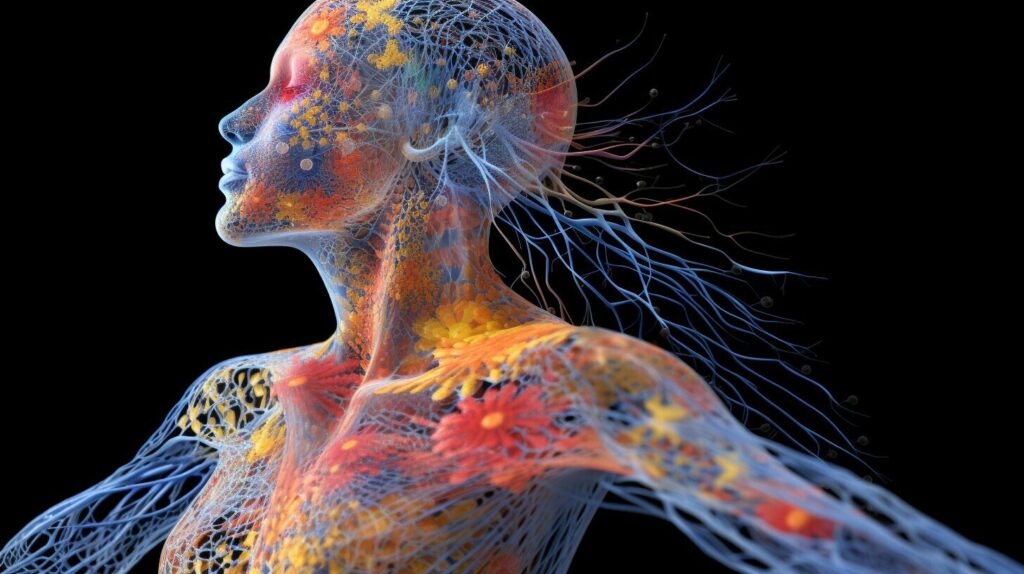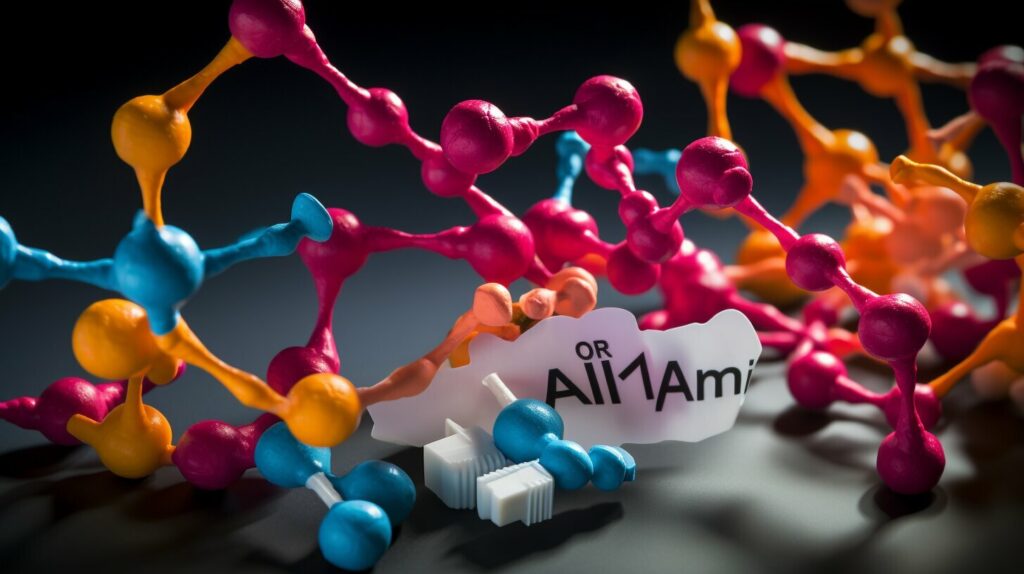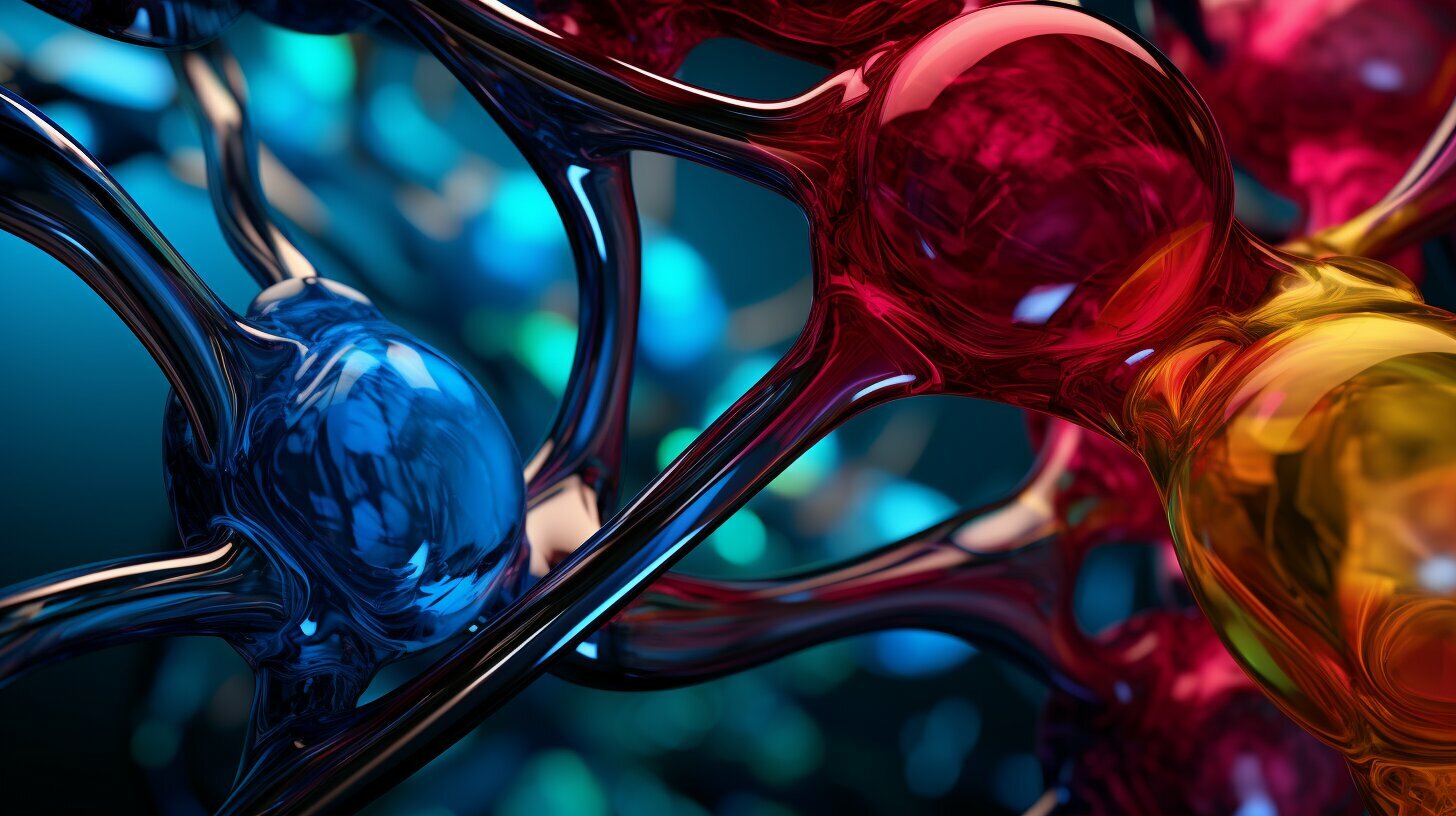Welcome to our article exploring the fascinating differences between lysine and arginine amino acids. These two positively charged amino acids play crucial roles in protein stability and function. Let’s dive into their unique properties and understand how they contribute to the world of biochemistry.
Key Takeaways:
- Lysine is an essential amino acid, while arginine is non-essential.
- Lysine provides less stability to proteins due to its geometric structure, while arginine provides more stability.
- Lysine is involved in proteinogenesis, carnitine production, and collagen crosslinking.
- Arginine serves as a precursor for nitric oxide synthesis and is important for cardiovascular health.
- Understanding the distinct properties of lysine and arginine is crucial for biomedical applications and protein biology research.
Lysine
Lysine is an essential amino acid that plays a vital role in various biological processes within the human body. It is involved in proteinogenesis – the synthesis of proteins – which is essential for growth, tissue repair, and immune function. Lysine also plays a crucial role in the production of carnitine, a molecule that aids in the metabolism of fatty acids.
One of the key functions of lysine is its involvement in the crosslinking of collagen polypeptides, which are essential for the formation of strong connective tissues such as skin, tendons, and bones. This amino acid also helps in the absorption of calcium, which is necessary for maintaining healthy bones and teeth. Furthermore, lysine has been studied for its potential antiviral properties, particularly in the treatment of cold sores caused by the herpes simplex virus.
Good dietary sources of lysine include meat, fish, dairy products, and legumes. However, it’s important to consume lysine in appropriate amounts as excessive intake can lead to neurological disorders. It’s always advisable to maintain a balanced diet to ensure an adequate supply of lysine and other essential amino acids for optimal health.
Lysine Benefits
- Essential for protein synthesis and tissue repair
- Plays a role in collagen formation for strong connective tissues
- Aids in the absorption of calcium for healthy bones and teeth
- Potential antiviral properties against cold sores
Lysine Sources
| Food Source | Lysine Content (per 100g) |
|---|---|
| Chicken | 2.43g |
| Tuna | 2.24g |
| Cheese (Parmesan) | 1.63g |
| Lentils | 0.85g |
Lysine Side Effects
While lysine is generally safe for most people, excessive intake can lead to certain side effects. These may include gastrointestinal issues such as diarrhea and abdominal cramps. It’s best to consult with a healthcare professional or registered dietitian to determine the appropriate lysine intake for your specific needs.
Lysine Function
Overall, lysine plays a crucial role in protein synthesis, tissue repair, collagen formation, and calcium absorption. Its numerous functions highlight the importance of ensuring an adequate intake of lysine-rich foods in order to support optimal health and well-being.

Arginine
Arginine is a non-essential amino acid that is synthesized by the human body. It serves as a precursor for the biosynthesis of nitric oxide, a molecule that plays a crucial role in various physiological processes, including vasodilation. This means that arginine helps to relax and widen blood vessels, which can have positive effects on cardiovascular health. In addition to its role in nitric oxide synthesis, arginine also has other important functions in the body.
There are several benefits associated with consuming arginine. Firstly, it can help improve exercise performance by increasing blood flow and nutrient delivery to muscles. This can lead to enhanced muscle strength and endurance. Arginine also supports the immune system by promoting the production of immune cells and antibodies, which help protect the body against infections and diseases. Additionally, arginine plays a role in wound healing and tissue repair, making it important for overall recovery and maintaining healthy skin.
When it comes to dietary sources, arginine can be found in a variety of protein-rich foods such as meat, fish, dairy products, and nuts. These sources provide the body with the necessary building blocks to synthesize arginine internally. However, it is important to note that excessive consumption of arginine can lead to gastrointestinal issues such as diarrhea and bloating. Therefore, it is recommended to consume arginine in moderation and as part of a balanced diet.
| Benefits of Arginine | Sources of Arginine | Potential Side Effects | Function in the Body |
|---|---|---|---|
| Improved exercise performance Enhanced muscle strength and endurance Supports the immune system Promotes wound healing and tissue repair |
Meat Fish Dairy products Nuts |
Gastrointestinal issues (diarrhea, bloating) | Precursor for nitric oxide synthesis Increased blood flow and nutrient delivery to muscles Immune cell and antibody production Wound healing and tissue repair |
Protein Stability and Electrostatic Interactions
Lysine and arginine, two positively charged amino acids, play critical roles in protein stability. Their distinctive properties contribute to the overall stability of protein structures through electrostatic interactions. Lysine, with its unique geometric structure, provides less stability compared to arginine due to its fewer electrostatic interaction possibilities.
The positive charges of lysine and arginine enable them to form electrostatic interactions with negatively charged residues on protein surfaces. These interactions help maintain the structural integrity of proteins. However, the different properties of lysine and arginine result in varying levels of stability.
One significant factor impacting stability is the geometric structure of lysine. Its side chain extends horizontally, limiting the directions in which it can form electrostatic interactions. Arginine, on the other hand, has a guanidino group that allows for multiple possible directions of electrostatic interactions, leading to enhanced stability.
The Role of Electrostatic Interactions
Electrostatic interactions between lysine or arginine and negatively charged residues on protein surfaces are vital for protein stability. These interactions occur through the attraction between the positive and negative charges. The ability to form multiple electrostatic interactions, as seen in arginine, strengthens the protein structure and increases stability.
Understanding the properties of lysine and arginine and their impact on protein stability paves the way for deeper insights into protein folding, stability, and function. By studying these amino acids, scientists can gain valuable knowledge to develop strategies for enhancing protein stability or modifying protein structures for various biomedical applications.
| Amino Acid | Properties | Stability Contribution |
|---|---|---|
| Lysine | Unique geometric structure | Provides less stability |
| Arginine | Guanidino group, multiple electrostatic interaction directions | Provides more stability |
Biomedical Applications
Lysine and arginine, two positively charged amino acids, have distinct properties that make them valuable in various biomedical applications. Lysine plays a crucial role in proteinogenesis, the process of protein synthesis. It is involved in the formation of collagen, a protein essential for the strength and integrity of connective tissues. Additionally, lysine plays a role in epigenetic histone modifications, which can influence gene expression and cellular function.
Arginine, on the other hand, is involved in the biosynthesis of nitric oxide, a molecule with important physiological functions, including vasodilation and cardiovascular health. Arginine-containing peptides have also been studied for their cell-penetrating ability, making them potential tools for drug delivery systems. These properties of lysine and arginine make them valuable in tissue repair, wound healing, and various areas of biomedical research and development.

Lysine in Proteinogenesis
Lysine’s role in proteinogenesis makes it essential for the growth, repair, and maintenance of body tissues. It is involved in the synthesis of proteins, which are the building blocks of cells and perform various functions in the body. Lysine is particularly important in the production of collagen, the main structural protein in connective tissues, such as skin, tendons, and cartilage. Collagen provides strength and elasticity to these tissues, supporting their function and integrity.
Arginine in Nitric Oxide Synthesis
Arginine is involved in the biosynthesis of nitric oxide, a molecule that regulates numerous physiological processes. Nitric oxide acts as a vasodilator, relaxing and widening blood vessels, which improves blood flow and cardiovascular health. It also plays a role in immune function, neurotransmission, and cell signaling. The ability of arginine to promote nitric oxide synthesis makes it relevant in the treatment and prevention of cardiovascular diseases and other conditions related to impaired blood flow.
In conclusion, lysine and arginine have important roles in protein stability and function and contribute to various biomedical applications. Lysine’s involvement in proteinogenesis and collagen synthesis makes it essential for tissue repair and wound healing. Arginine’s participation in nitric oxide synthesis has implications for cardiovascular health and other physiological processes. Understanding the unique properties and functions of lysine and arginine provides valuable insights into protein biology and the development of biomedical interventions.
Conclusion
In conclusion, the comparison between lysine and arginine reveals their unique properties and functions in protein stability and overall health. Lysine, an essential amino acid, plays a vital role in protein synthesis, collagen crosslinking, and tissue repair. It is found in various dietary sources such as meat, fish, dairy products, and legumes. However, it is crucial to consume lysine in appropriate amounts as excessive intake can lead to neurological disorders.
On the other hand, arginine, a non-essential amino acid, is involved in the synthesis of nitric oxide and contributes to cardiovascular health and vasodilation. It can be obtained from protein-containing foods like meat, fish, dairy products, and nuts. Although well-tolerated, high doses of arginine may cause gastrointestinal discomfort.
Understanding the distinct characteristics of lysine and arginine enhances our knowledge of protein biology and has significant implications in various biomedical applications. From tissue repair and wound healing to epigenetic modifications and drug delivery systems, both amino acids demonstrate their importance in advancing healthcare and scientific research.
FAQ
What is the difference between lysine and arginine amino acids?
Lysine is an essential amino acid that needs to be obtained from the diet, while arginine can be synthesized in the body.
What are the benefits of lysine?
Lysine plays multiple roles in the human body, including protein synthesis, production of carnitine, and collagen crosslinking for connective tissue formation.
What are the sources of lysine?
Good dietary sources of lysine include meat, fish, dairy products, and legumes.
What are the side effects of lysine?
Excessive lysine intake can lead to neurological disorders, so it’s important to consume it in appropriate amounts.
What are the benefits of arginine?
Arginine serves as a precursor for nitric oxide synthesis, which is involved in various physiological processes, including vasodilation.
What are the sources of arginine?
Arginine is found in protein-containing foods such as meat, fish, dairy products, and nuts.
What are the side effects of arginine?
High doses of arginine may cause gastrointestinal issues, including diarrhea and bloating.
What is the role of lysine and arginine in protein stability?
Lysine and arginine form electrostatic interactions with proteins, contributing to overall stability. Lysine provides less stability due to its geometric structure, while arginine provides more stability.
What are the biomedical applications of lysine and arginine?
Lysine is important in tissue repair, wound healing, and epigenetic histone modifications. Arginine is relevant in cardiovascular health, vasodilation, and cell-penetrating peptides for drug delivery systems.
 Skip to main content
Skip to main content


